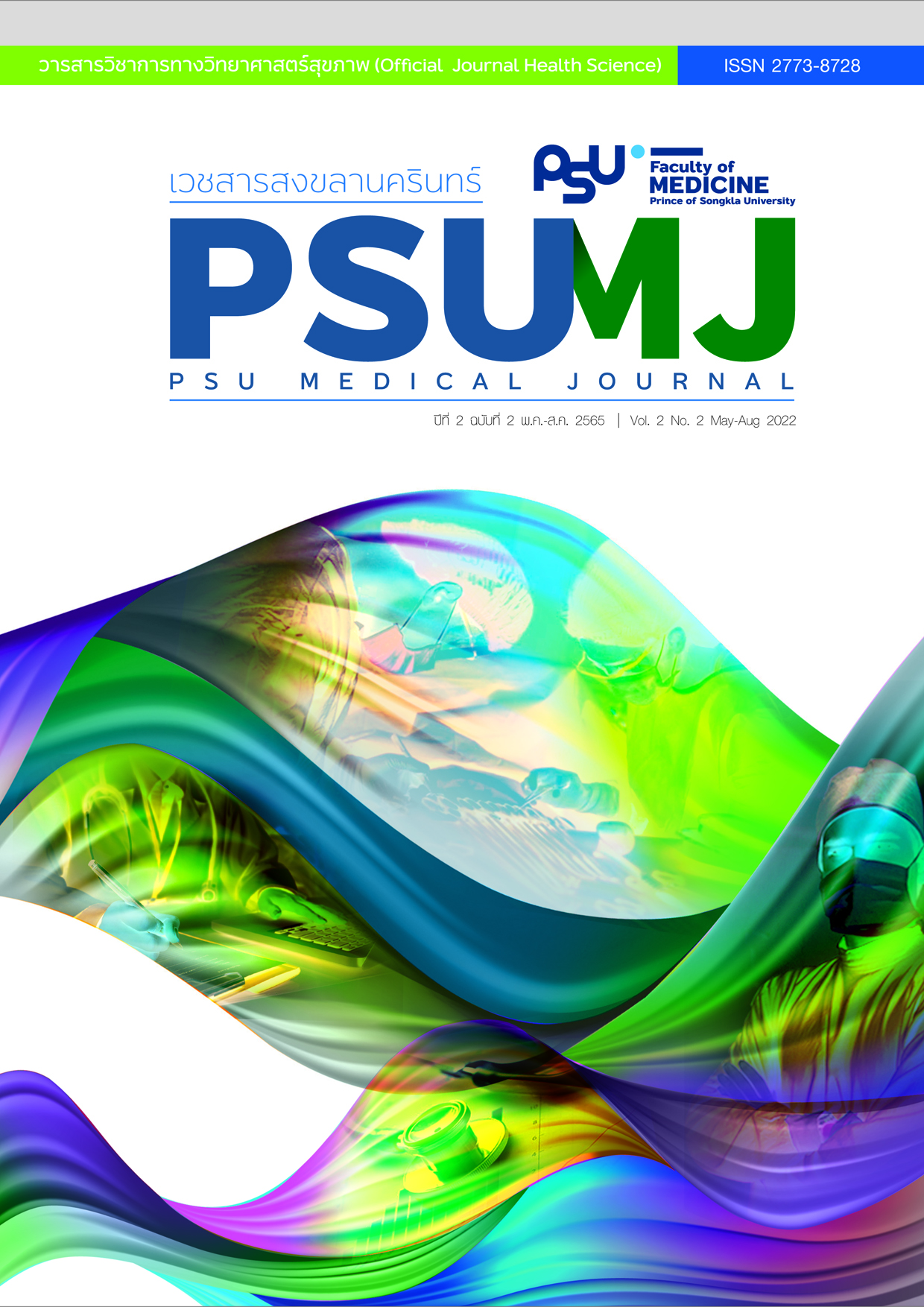Update in Postoperative Cognitive Dysfunction after Cardiac Surgery: A Literature Review
Cognitive Dysfunction after Cardiac Surgery
DOI:
https://doi.org/10.31584/psumj.2022254213Keywords:
cardiac surgery, cognitive function, elderlyAbstract
Cardiac surgery is a common surgery in the elderly including of coronary artery bypass surgery and valvular heart surgery. The major complication after cardiac surgery is neurological complication. Postoperative cognitive dysfunction (POCD) is one of the major neurological complications. Patients who have neurological complications are reported to have a lower ability to form and organize their thoughts and understanding after the completion of surgery. POCD has the consequences in all health aspects. For instance, a longer period of hospital stay, poor quality of life and the increased rate of other complications.
However, there is no precise definition of cognitive impairment. In order to diagnose, preoperative neuropsychological tests are normally compared with postoperative neuropsychological tests. However, other similar neurological diseases after the surgery should be ruled out.
The risk factors for POCD were categorized into 3 major factors. Firstly, surgical factors which are systematic inflammation, cerebral microemboli, global hypoperfusion, induced hypothermia, and extreme hemodilution. Secondly, anesthetic factor which is total intravenous anesthesia. Thirdly, patient factors which are age, underlying disease, genetic, and smoking habit. If these mentioned conditions can be addressed before surgery, the incidence of cognitive impairment is very likely to be lower.
References
Glumac S, Kardum G, Karanovic N. Postoperative cognitive decline after cardiac surgery: a narrative review of current knowledge in 2019. Med Sci Monit 2019;25:3262–70.
Naknonehun P, Prechaterasat A, Kittayarak C. Risk factors for postoperative cognitive dysfunction after coronary bypass grafting in older adults. Nurs J Ministry Public Health 2020;30:72–82.
Rundshagen I. Postoperative cognitive dysfunction. Dtsch Arztebl In 2014;111:119–25.
Yuan S-M, Lin H. Postoperative cognitive dysfunction after coronary artery bypass grafting. Braz J Cardiovasc Surg 2019;34:76–84.
Ge Y, Ma Z, Shi H, Zhao Y, Gu X, Wei H. Incidence and risk factors of postoperative cognitive dysfunction in patients underwent coronary artery bypass grafting surgery. Zhong Nan Da Xue Xue Bao Yi Xue Ban 2014;39:1049–55.
Kennedy ED, Choy KCC, Alston RP, Chen S, Farhan-Alanie MMH, Anderson J, et al. Cognitive outcome after on- and offpump coronary artery bypass grafting surgery: a systematic review and meta-analysis. J Cardiothorac Vasc Anesth 2013;27:253–65.
Berger M, Terrando N, Smith SK, Browndyke JN, Newman MF, Mathew JP. Neurocognitive function after cardiac surgery: from phenotypes to mechanisms. Anesthesiology 2018;129:829–51.
Parolari A, Camera M, Alamanni F, Naliato M, Polvani GL, Agrifoglio M, et al. Systemic inflammation after on-pump and off-pump coronary bypass surgery: a one-month follow-up. Ann Thorac Surg 2007;84:823–8.
Royse CF, Saager L, Whitlock R, Ou-Young J, Royse A, Vincent J, et al. Impact of methylprednisolone on postoperative quality of recovery and delirium in the steroids in cardiac surgery trial: a randomized, double-blind, placebo-controlled substudy. Anesthesiology 2017;126:223–33.
Ottens TH, Dieleman JM, Sau r A-MC, Peelen LM, Nierich AP, de Groot WJ, et al. Effects of dexamethasone on cognitive decline after cardiac surgery: a randomized clinical trial. Anesthesiology 2014;121:492–500.
Glumac S, Kardum G, Sodic L, Supe-Domic D, Karanovic N. Effects of dexamethasone on early cognitive decline after cardiac surgery: a randomised controlled trial. Eur J Anaesthesiol 2017;34:776-84.
Sun X, Lindsay J, Monsein LH, Hill PC, Corso PJ. Silent brain injury after cardiac surgery: a review: cognitive dysfunction and magnetic resonance imaging diffusion-weighted imaging findings. J Am Coll Cardiol 2012;60:791–7.
Shroyer AL, Grover FL, Hattler B, Collins JF, McDonald GO, Kozora E, et al. On-Pump versus off-pump coronary-artery bypass surgery. N Engl J Med 2009;361:1827-37.
Siepe M, Pfeiffer T, Gieringer A, Zemann S, Benk C, Schlensak C, et al. Increased systemic perfusion pressure during cardiopulmonary bypass is associated with less early postoperative cognitive dysfunction and delirium. Eur J Cardiothorac Sur 2011;40:200–7.
van Harten AE, Scheeren TWL, Absalom AR. A review of postoperative cognitive dysfunction and neuroinflammation associated with cardiac surgery and anaesthesia. Anaesthesia 2012;67:280–93.
Mathew JP, Mackensen GB, Phillips-Bute B, Stafford-Smith M, Podgoreanu MV, Grocott HP, et al. Effects of extreme hemodilution during cardiac surgery on cognitive function in the elderly. Anesthesiology 2007;107:577–84.
Royse CF, Andrews DT, Newman SN, Stygall J, Williams Z, Pang J, et al. The influence of propofol or desflurane on postoperative cognitive dysfunction in patients undergoing coronary artery bypass surgery Anaesthesia 2011;66:455–64.
Tan AMY, Amoako D. Postoperative cognitive dysfunction after cardiac surgery. Continuing Educ in Anaesthesia Critical Care & Pain 2013;13:218–23.
Hudetz JA, Iqbal Z, Gandhi SD, Patterson KM, Byrne AJ, Hudetz AG, et al. Ketamine attenuates post-operative cognitive dysfunction after cardiac surgery. Acta Anaesthesiol Scand 2009;53:864–72.
Chen F, Duan G, Wu Z, Zuo Z, Li H. Comparison of the cerebroprotective effect of inhalation anaesthesia and total intravenous anaesthesia in patients undergoing cardiac surgery with cardiopulmonary bypass: A systematic review and meta- Analysis. BMJ Open 2017;7:e014629.
Schricker T, Sato H, Beaudry T, Codere T, Hatzakorzian R, Pruessner JC. Intraoperative maintenance of normoglycemia with insulin and glucose preserves verbal learning after cardiac surgery. PLoS One 2014;9:e99661.
Greaves D, Psaltis PJ, Davis DHJ, Ross TJ, Ghezzi ES, Lampit A, et al. Risk factors for delirium and cognitive decline following coronary artery bypass grafting surgery: a systematic review and meta-analysis. J Am Heart Assoc 2020;9:e017275.
Bruggemans EF. Cognitive dysfunction after cardiac surgery: Pathophysiological mechanisms and preventive strategies. Neth Heart J 2013;21:70–3.
Polunina AG, Golukhova EZ, Guekht AB, Lefterova NP, Bokeria LA. Cognitive dysfunction after on-pump operations: neuropsychological characteristics and optimal core battery of tests. Stroke Res Treat 2014;2014:302824.
van Sinderen K, Schwarte LA, Schober P. Diagnostic criteria of postoperative cognitive dysfunction: a focused systematic review. Anesthesiol Res Pract 2020;2020:7384394.
Arnett JA, Labovitz SS. Effect of physical layout in performance of the Trail Making Test. Psychol Assess 1995;7:220–1.
Tripathi R, Kumar K, Bharath S, Marimuthu P, Varghese M. Age, education and gender effects on neuropsychological functions in healthy Indian older adults. Dement Neuropsychol 2014;8:148–54.
Lezak MD. Neuropsychological assessment. New York: Oxford University Press; 2004.
Schroeder RW, Twumasi-Ankrah P, Baade LE, Marshall PS. Reliable digit span: a systematic review and cross-validation study. Assessment 2012;19:21-30.
Miotto E, Campanholo K, Rodrigues M, trunkl serrao V, Lucia M, Scaff M. Hopkins verbal learning test-revised and brief visuospatial memory test-revised: preliminary normative data for the Brazilian population. Arq Neuropsiquiatr 2012;70:962–5.
Mitchell AJ. A meta-analysis of the accuracy of the minimental state examination in the detection of dementia and mild cognitive impairment. J Psychiatr Res 2009;43:411–31.
Tangwongchai S, Charernboon T, Phanasathit M, Akkayagorn L, Hemrungrojn S, Phanthumchinda K, et al. The validity of thai version of the montreal cognitive assessment (MoCA-T). Dement Neuropsychol 2009;3:136-78.
Kok WF, Koerts J, Tucha O, Scheeren TWL, Absalom AR. Neuronal damage biomarkers in the identification of patients at risk of long-term postoperative cognitive dysfunction after cardiac surgery. Anaesthesia 2017;72:359–69.
Lombard FW, Mathew JP. Neurocognitive dysfunction following cardiac surgery. Semin Cardiothorac Vasc Anesth 2010;14:102– 10.
Slater JP, Guarino T, Stack J, Vinod K, Bustami RT, Brown JM, et al. Cerebral oxygen desaturation predicts cognitive decline and longer hospital stay after cardiac surgery. Ann Thorac Surg 2009;87:36–44; discussion 44-5.
Leslie K, Short TG. Low bispectral index values and death: the unresolved causality dilemma. Anesth Analg 2011;113:660-3
By the American Geriatrics Society 2015 Beers Criteria Update Expert Panel. American geriatrics society 2015 updated beers criteria for potentially inappropriate medication use in older adults. J Am Geriatr Soc 2015;63:2227–46.
Sau r A-MC, Slooter AJC, Veldhuijzen DS, van Eijk MMJ, Devlin JW, van Dijk D. Intraoperative dexamethasone and delirium after cardiac surgery: a randomized clinical trial. Anesth Analg 2014;119:1046–52.
Hudetz JA, Pagel PS. Neuroprotection by ketamine: a review of the experimental and clinical evidence. J Cardiothorac Vasc Anesth 2010;24:131–42.
Bilotta F, Gelb AW, Stazi E, Titi L, Paoloni FP, Rosa G. Pharmacological perioperative brain neuroprotection: a qualitative review of randomized clinical trials. Br J Anaesth 2013;110 (Suppl 1):i113-20.
Grigore AM, Murray CF, Ramakrishna H, Djaiani G. A core review of temperature regimens and neuroprotection during cardiopulmonary bypass: does rewarming rate matter? Anesth Analg 2009;109:1741–51.
Downloads
Published
How to Cite
Issue
Section
License
Copyright (c) 2022 Author and Journal

This work is licensed under a Creative Commons Attribution-NonCommercial-NoDerivatives 4.0 International License.








